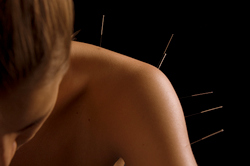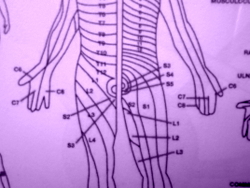British researchers have found that the wide-ranging lifestyle advice given by acupuncturists to patients with chronic neck pain, is associated with reduced pain and disability. In a three-arm trial, 517 patients were randomly allocated to receive acupuncture (up to 12 sessions), Alexander treatment or usual care. Acupuncturists were encouraged to provide their usual lifestyle advice, tailored to each patient, and covering such matters as exercise, relaxation, diet, rest and work. Advice was found to be provided to 84% of patients.
Compared with those in the usual care group, acupuncture patients made more lifestyle changes and improved their ability to reduce their neck pain without resorting to medication. This behaviour was associated with significant reductions in pain and disability scores after 12 months. The authors conclude that lifestyle advice based on acupuncture theory leads to active patient engagement, and this in turn makes an important contribution to treatment benefits.
(Lifestyle Advice and Self-Care Integral to Acupuncture Treatment for Patients with Chronic Neck Pain: Secondary Analysis of Outcomes Within a Randomized Controlled Trial. Journal of Alternative & Complementary Medicine, March 2017.)



 Researchers in Belgium have found that just one session of acupuncture can already start to ease the discomfort of whiplash injuries. In a randomised, crossover, pilot trial, a total of 39 patients with chronic whiplash-associated disorders, received two treatment sessions of twenty minutes duration, of acupuncture and relaxation therapy randomly crossed over. Acupuncture was given by professional practitioners with at least 15 years experience in traditional Chinese treatment.
Researchers in Belgium have found that just one session of acupuncture can already start to ease the discomfort of whiplash injuries. In a randomised, crossover, pilot trial, a total of 39 patients with chronic whiplash-associated disorders, received two treatment sessions of twenty minutes duration, of acupuncture and relaxation therapy randomly crossed over. Acupuncture was given by professional practitioners with at least 15 years experience in traditional Chinese treatment.